#ocean education
Explore tagged Tumblr posts
Text
youtube
The Majestic Blue Whale Unveiled
Discover the wonders of the blue whale, the ocean's giant! Dive into their incredible adaptations and role in the marine ecosystem.
Check out my other videos here: Animal Kingdom Animal Facts Animal Education
#Helpful Tips#Wild Wow Facts#blue whale#majestic blue whale#ocean giants#marine life#largest animal on earth#endangered species#whale watching#underwater world#marine conservation#whale facts#ocean wildlife#sea creatures#marine biology#ocean ecosystems#animal documentaries#wildlife exploration#ocean wonders#deep sea animals#whale behavior#marine research#aquatic animals#ocean education#marine mammals#nature documentary#ocean preservation#youtube#animal habitats#animal science
0 notes
Text
Fish of the Day
Today's fish of the day is the Alabama Cavefish!
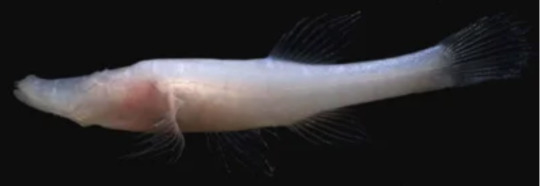
The Alabama Cavefish, scientific name Speoplatyrhinus poulsoni, is known for being one of the rarest troglobitic fish species in North America. Discovered in 1967, by the time the alabama cavefish was scientifically described in 1974, there were only about 100 fish left. On any visit to the cave, only about 10 fish have ever been seen, but they are consistently different fish, so the estimated number is a little under 100, making them critically endangered. This also makes them a possibility for the rarest cavefish in North America!
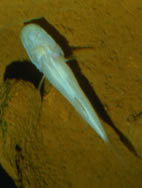
Despite the large waterways connecting caves in Key Cave National park to several other cave systems, the Alabama cavefish has restricted itself to only one cave for reasons we don't understand. A search of over 120 caves in the surrounding area revealed no populations or signs of populations. With a range consisting only of Key cave in Lauderdale county, Alabama; these fish are constantly faced by the threat of extinction, and most of their worries are based on the limited home range, and waters entering the cave. Any water with chemicals, especially fertilizers and other agricultural runoff are a large concern. That along with competition from more aggressive cavefish, and predation from nearby crawfish. Due to their living situation and delicate population, much is unknown about these fish. But, let us go over what we do know!

The diet of the Alabama cavefish consists mostly of invertebrates found in the caves: copepods, isopods, smaller cavefish, spiders, beetles, and anything else it can find that will fit in its mouth. They grow up to a size of 2-3 inches in length. They have no eyes or pigment, and hunt solely based off of sensory protrusions that dot the head and sides, a trait evolved to handle the almost complete darkness. These fish have no breeding season, and instead breed based off of the environmental signal: when the caves flood in the winter and spring. Insufficient flooding can lead to years where no breeding or spawning occurs, and when it does females carry few eggs, and even fewer eggs hatch. Their lifespans, based off of the lifespan of Northern cavefish, are an estimated 5-10 years.
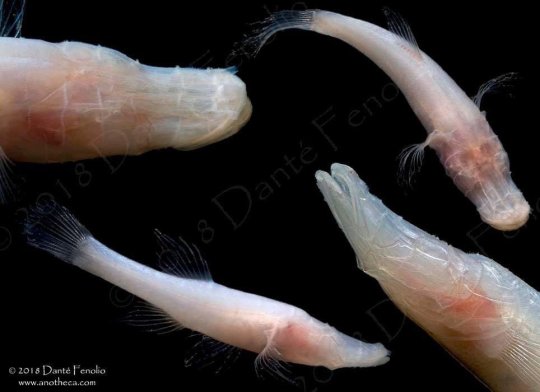
#fish#fish of the day#fishblr#fishposting#aquatic biology#marine biology#freshwater#freshwater fish#animal facts#animal#animals#fishes#informative#education#aquatic#aquatic life#nature#river#ocean#alabama cavefish#cavefish#cave fish#Speoplatyrhinus poulsoni
781 notes
·
View notes
Text

Coconut octopus (Amphioctopus marginatus)
#photography#explore#nature#science#adorable#gifs#gif#education#lol#animals#zoology#amazing#awesome#animal#invertebrates#oceans#sea#marine#moving#marine life#marine biology#funny#amphioctopus#coconutoctopus#octopus#cephalopod#pacific ocean
588 notes
·
View notes
Text

Found a picture I took in Ocean Park and I knew I had to draw sanji in it
#my art#one piece#sanji#vinsmoke sanji#monkey d luffy#for anyone not in the know Ocean park is a hong kong aquarium/theme park/educational place#Its great#I love it#IT ALSO HAS A WATERPARK NOW SO#MASSIVE W
118 notes
·
View notes
Text
There is a pissed off killer whale patrolling the waters of Portsmouth NH today. Have your head on swivel if you’re out there. 🤔
#pay attention#educate yourselves#educate yourself#knowledge is power#reeducate yourself#reeducate yourselves#think about it#think for yourselves#think for yourself#do your homework#do some research#do your own research#ask yourself questions#question everything#killer whale#sea life#ocean life#crazy times#nature
232 notes
·
View notes
Text
Man i wanna study everything and nothing at the same time like god gimme the strength of chosing a career path ffs
There is psychology and then there is navy and im already a diploma deep into the education field also i wanna be a tech genie and a creative af person somebody kill the perfectionist inside me so that ill stop expecting to build a career in every hobby of mine from myself without exploring anything 😀
#neeks rambling 🍫#thoughts 💭#i wanna study a lot#knowledge#space#ocean#chess#mathematics#sea#education#psychology#dance#technology#navy
270 notes
·
View notes
Text





GOD THE SET DESIGN IS BEAUTIFUL, PROPS TO EVERYONE WHO TOOK PART IN IT!!! ITS MAGNIFICENT AND I WANT TO KNOW EVERYTHING ABOUT IT!!! ITS GORGEOUS, THE RAILS AT THE TOP??? THE MISCELLANEOUS FAIR PARTS LIKE THE SEAT RICKY SITS IN (2016) AND THE CYCLONE SIGN?? THE BEAUTIFUL ARCH?? ITS AMAZING <<<333
I LOVE THEATER SET DESIGN ‼️‼️
#ride the cyclone#noel gruber#mischa bachinski#ricky potts#ocean rosenberg#jane doe#constance blackwood#ride the cyclone set#rtc#set design#someone educate me on everything set design ill actually be your servant for TWO days#its facinating#theatre sets#theatre#stage crew
205 notes
·
View notes
Text
It was mentioned that Tongrak is willing to support Mahasamut's studies so now I'm sitting here waiting for him to grab that chance so we can officially call him a Marine Biologist
#love sea the series#he's a smart guy who cares deeply about marine life. it feels inevitable.#we literally SAW him taking notes down there. he's already doing scientific work.#his love and concern for the ocean is one of his main personality traits. it's the reason why he was disowned.#I hope we can see how that affects his decisions going forward#(it could also help balancing their relationship‚ and fix the issue within his self-esteem caused by his ''lack of education'')
43 notes
·
View notes
Text
🐢Daily Sea Turtle Fact:🐢
Olive Ridley Sea Turtle: The olive ridley gets its name from the olive green color of its heart-shaped shell. The species is among the smallest of the world’s sea turtles and is found primarily in the tropical regions of the Pacific, Indian, and Atlantic oceans. Similar to Kemp's Ridleys, large groups of turtles gather offshore of nesting beaches. Then, all at once, vast numbers of turtles come ashore and nest in what is known as an "arribada" which means "arrival" in Spanish. During these arribadas, hundreds to thousands of females come ashore to lay their eggs.
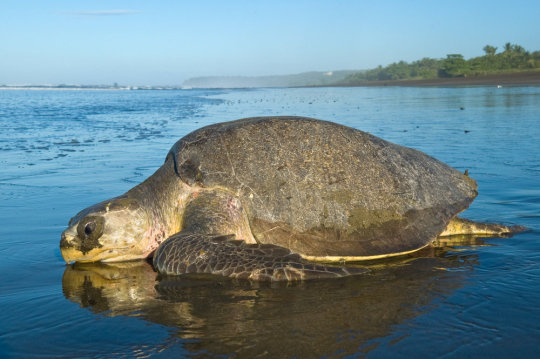
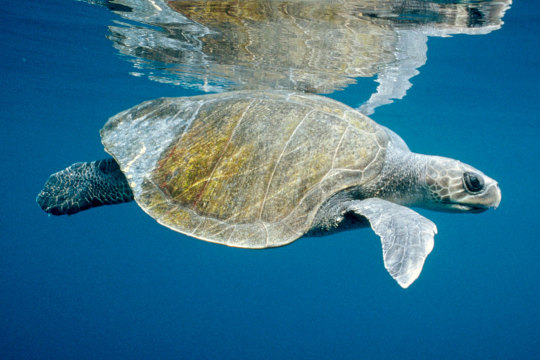
#olive ridley sea turtle#sea turtle#sea turtle fact#sea turtle post#daily sea turtle#daily sea turtle fact#facts about sea turtles#marine animals#marine#marine life#marine biology#marine life blog#ocean animal#ocean life#ocean#ocean life blog#advocacy for marine life#marine life education#marine life advocate#turtle turtle#feelin turtley
47 notes
·
View notes
Text
Today’s daily ocean fact: moon jellyfish have four stomaches!
The four flower-petal shaped things in the photo below are the jellyfish’s stomaches. Unlike most jellyfish, their stingers are completely harmless to humans. This is why these jellyfish are commonly kept in aquariums!

[Image ID: A photo of a moon jellyfish against a black background. The jellyfish is silvery in colour and mostly translucent. It has four semi-circular stomaches near its center.]
#moon jellyfish are so pretty#education#marine biology#ocean#science#daily facts#trivia#fun facts#jellyfish#sea jelly#sea jellies#cnidarian#aquarium#moon jellyfish#moon jellies
24 notes
·
View notes
Text
🦈It's Uquiz time🦈
Brought to you by learning way too much about sharks
#Uquiz#shark#sharks#u quiz#personality test#personality quiz#new uquiz#original uquiz#educational uquiz#marine life#underwater#ocean#sea#sea creatures#My additions
290 notes
·
View notes
Text
youtube
The Blue Ringed Octopus Explained
Dive into the mesmerizing world of the Blue Ringed Octopus! Discover its vibrant colors, hunting techniques, and ecological significance.
Check out my other videos here: Animal Kingdom Animal Facts Animal Education
#Helpful Tips#Wild Wow Facts#Blue Ringed Octopus#Dangerous Sea Creatures#Marine Biology#Octopus Facts#Venomous Animals#Ocean Wildlife#Deadly Animals#Marine Life#Octopus Defense#Animal Behavior#Sea Creatures Explained#Underwater Animals#Blue Ringed Octopus Facts#Deadly Venom#Animal Adaptations#Ocean Ecosystem#Nature Documentary#Marine Science#Octopus Species#Aquatic Life#Dangerous Marine Animals#Ocean Predators#Animal Facts#Marine Conservation#Ocean Education#youtube#animal kingdom#animal education
0 notes
Text
Fish of the Day
Today's fish of the day is the lake sturgeon!
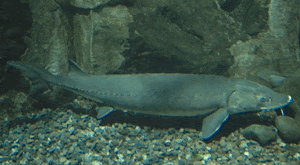
The lake sturgeon, also called the rock sturgeon, and known by scientific name Acipenser fulvescens is one of the best known North American sturgeon species! Found in and around the great lakes, and then across the Mississippi river and Erie canal. Found in 5 differing Canadian provinces and across 24 states stretching from Alabama to Michigan, and as far East as New York. These fish are benthic, spending their time along the bottom of the lake bed, but during spawning these fish will migrate thousands of miles to go back to the stream they were born in.

Like all sturgeon, they are considered living fossils, as sturgeon first appeared in the fossil record upwards of 150 million years ago, with the fish now appearing nearly identical to these ancestors. These fish can get 7 feet or longer, with most being only 4 to 6 feet in length, making them some of the largest sturgeon in North America. Their diet is made up of various invertebrates such as: larvae, small crustaceans, and worms, which they can find along the benthic lake and river beds. The 4 barbels found on these fish have taste buds, which are used to determine what is under their mouth, before they use their prehensile lips to suck up food. When food becomes scarce, these fish are known for migrating for better feeding, which happens semi frequently around the year.

The life cycle of the lake sturgeon is similar to that of most other sturgeons. They begin life as eggs laid in the location their parents were born, in fast paced river streams with lots of flat rocks. The eggs themselves are a bright yellow color, although as the eggs matures this will turn an olive and eventually brown over the course of about 2 weeks. Then they live as larvae only 10mm long, living in and around the dark underside of rocks. After this, as juveniles they will swim to lake environments, where they will spend the majority of their life cycle. These fish can live 55 years long in males and around 150 years for females, with sexual maturity being achieved at an age of around 10 years in males and 30 years in females. Breeding and spawning only happens intermittently every handful of years, and go through around 10 spawning seasons throughout their lifecycle.

For a fun fact to end on for these fish because I'm particularly fond of them, when they reach the stream they will spawn in, these fish are known to porpoise, jumping several feet into the air to end their long journey. That's the lake sturgeon everybody! Have a wonderful day!
#lake sturgeon#rock sturgeon#sturgeon#sturgeons#fish#fish of the day#fishblr#fishposting#aquatic biology#marine biology#freshwater#freshwater fish#animal facts#animal#animals#fishes#informative#education#aquatic#aquatic life#nature#river#ocean
185 notes
·
View notes
Text

Coconut octopus (Amphioctopus marginatus)
#photography#explore#nature#science#adorable#gifs#gif#education#lol#animals#zoology#amazing#awesome#animal#invertebrates#oceans#sea#marine#moving#marine life#marine biology#funny#amphioctopus#coconutoctopus#octopus#cephalopod#pacific ocean
173 notes
·
View notes
Text
Throwback Thursday: Harry Hess and Seafloor Spreading.

This is Harry Hammond Hess. He was the man who came up with an idea to answer Alfred Wegener's Continental Drift question: how did it happen?
He served in the US Navy where he became intrigued by the geology of the seafloor. Essentially, he noticed that the seafloor was shallower in the middle than along the edges. He identified mid-ocean ridges,

and deep ocean trenches.

He said that new crust was made at the mid-ocean ridges as magma oozed up out of the vents and onto the ocean floor. He noted that oceanic crust was youngest near the mid-ocean ridge and older further away. He also noted that both sides of the ridge were symmetrical.

He said that the trenches were where the ocean floor was destroyed and recycled, subsiding beneath the surface and sinking into the mantle to be melted back into magma.

Tune in tomorrow for a look at an animal made famous because it died due to a volcanic eruption of the Yellowstone hotspot. (And tune in next Thursday to learn about some other scientists who aided Henry Hess in his seafloor spreading theory).
14 notes
·
View notes
Text
NEW UNDERWATER OCEAN DISCOVERED - bigger than all Oceans combined 🤔
#pay attention#educate yourselves#educate yourself#knowledge is power#reeducate yourself#reeducate yourselves#think about it#think for yourselves#think for yourself#do your homework#do some research#do your own research#ask yourself questions#question everything#news#ocean#earth
172 notes
·
View notes